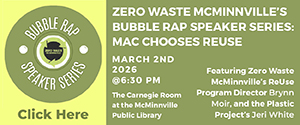Meador: Changing the face of policing
Guest writer Matthew Meador, a former News-Register employee making his home in McMinnville, landed his first writing gig as a columnist at a weekly newspaper in 1984. He’s been at it ever since via various venues, both print and digital. A moderate Republican, he’s convinced that for every issue people clash over, there are many more on which they share common ground — or would if they simply talked over their differences calmly and rationally.
Darian Greene wants to be a cop.
With the abundance of action movies and television shows focused on law enforcement, Darian’s curiosity isn’t surprising.
At 15 years old, Darian, whose name was changed here to protect his privacy, is just starting to consider his future. And, like a lot of teenagers, he finds law enforcement holds some appeal.
But Darian isn’t a typical teen, at least in the sense of his career interest. Darian is Black.
A Black teenage youth considering law enforcement for a career is not common in 2021. If Darian were white, his aspirations wouldn’t even be noticed. But as a Black male thinking about law enforcement as a career, he’s a rarity. And frankly, this situation is shameful.
I want to be clear that I am not anti-police.
My father wore a badge in Southern California when I was a child. In retirement, he got recertified and once again wears the badge of a sizable sheriff’s office.
My cousin wears a badge and my uncle serves as chaplain to a mid-sized municipal police department. All three are honorable men who hold themselves to the highest standard.
But I could list thousands of incidents — yes, thousands — that have removed law enforcement from potential career options for Black kids.
When the phrase “defund the police” started appearing a little over a year ago, most people with level heads recognized it as ludicrous — at least if taken literally.
Any orderly society needs the police. Only the most optimistically naive could believe we could get along without law enforcement.
Nonetheless, I’m convinced we desperately needed to hear that phrase, and I’m not alone in that. “That phrase woke people up,” says Janie Schutz, a longtime law enforcement officer currently serving as relationship manager for the Center for Policing Equity.
Schutz held numerous street-level and supervisory positions in law enforcement before heading up the police departments in Wadesboro, North Carolina, and Forest Grove, Oregon. And she argues, “Both the public and the law enforcement community needed to hear those startling words.”
Law enforcement is possibly the most difficult, thankless job on the planet. I’ve said it more than once.
Every move an officer makes is subject to immediate and ongoing scrutiny. Every incident is second-guessed by people who weren’t there and don’t understand police training and the law.
Cops are jeered, criticized, spat on, mocked and assaulted, yet we expect them — correctly — to exercise a superhuman level of self-control. We expect them to evaluate life-threatening situations and react properly in a split second every time. Almost no job comes with such enormous expectations.
I believe the majority of police officers are good men and women. I believe most work hard to uphold the law while supporting the communities they serve.
But I don’t believe “just a few bad apples” are giving the profession a bad name. It’s more than a few.
Far too many egregious examples of misconduct continue to happen, every week, too often followed by cover-up actions. It’s time for meaningful change.
So where do we start? The way I see it, most police problems can be loosely sorted into two impossibly broad categories: training and personnel.
Chief Schutz agrees. In addition to her long experience, she has put a great deal of research and thought into the matter, culminating in the Oregon Policing Equity Plan.
“The plan focuses on proper recruitment and then emphasizes training and policy,” Schutz said. To help illustrate the two categories, consider the events at Hobgood Elementary School in Murfreesboro, Tennessee back in April 2016.
Three uniformed police officers arrested and handcuffed four Black girls: a sixth grader, two fourth graders and an 8-year-old third grader. Their crime? They failed to stop a “fight” between two first-grade-age boys and a slightly older boy.
It was barely even a schoolyard fight in the traditional sense. Proper training would’ve ensured any intelligent officer knew that handcuffing a young Black girl in pigtails was outrageous — a wildly inappropriate reaction against a child who didn’t commit any kind of crime.
Worse, none of the three officers apparently recognized the moral depravity of his actions. This problem can be mitigated by tightening the standards of who can wear a badge.
When it comes to policing in America, the first thing we need to do is get rid of the mall security guards. What I mean is that not-too-bright white guys with a desperate desire to sport a badge have no place in our justice system. Well, no place outside of that mall, anyway.
Compared to other professions, law enforcement is a no-fail mission. Police officers have the power of life and death over the public, so they’re expected to be highly disciplined, thus able to correctly act in a split second during deadly situations. It’s crucial that departments hire men and women of a caliber able to take on this deadly serious task.
The purpose of Schutz’s Oregon Policing Equity Plan is to engage in meaningful, unified, statewide police reform. So the plan addresses officer recruitment, education, training, department policy and community engagement.
Schutz correctly places a very heavy emphasis on communication, recognizing its crucial place in law enforcement. Let’s take a closer look.
Refreshingly, OPEP’s first objective is increasing the working knowledge law enforcement officers have of the racial, economic and systemic barriers affecting community relationships with police.
The plan outlines detailed instruction the Oregon Department of Public Safety Standards and Training will conduct on historic race relations in Oregon and America.
It covers structural racism in society and the justice system. And it highlights cultural beliefs toward law enforcement and even get into the physiology of generational poverty.
Perhaps nothing else is as important as cops understanding the communities they serve.
Addressing personnel issues, OPEP recognizes the unique and potentially deadly nature of split-second decisionmaking in high stress environments. Thus, benchmarks for hiring are standardized across the state, emphasizing screening for maturity.
The plan also creates an educational pathway and internship for prospective law enforcement officers. This mandatory pathway provides additional opportunities for screening and ensures candidates are educated in the above topics in addition to psychology, sociology, social work and law.
It also requires completion of Black, Latino and Native studies. And it requires completion of an internship at a community-based organization serving at-risk youth, communities of color, foster care clients, domestic violence victims or any other population with high law enforcement contact to gain meaningful experience.
One of OPEP’s most important goals is to decrease disproportionate contacts law enforcement officers have with communities of color. To this end, an outside agency will review data and develop comprehensive action plans. Another third party will monitor each department’s progress.
Related to all this, the plan outlines steps to increase transparency, accountability and the voice of the community, relating to policing. It establishes community advisory councils, which will be given a clear set of roles and parameters in addition to annual reviews of OPEP.
Enacting the Oregon Policing Equity Plan should be a priority with lawmakers and community leaders across the state.
Darian Greene wants to be a cop. There should be nothing special about a Black youth like Darian looking at law enforcement as a career. If we can enact meaningful police reform across Oregon, kids like Darian might be commonplace one day.
Police departments should reflect the communities they serve — in other words, it shouldn’t be the exception for officers to look like those they’re policing.
When kids like Darian become cops, we are literally changing the face of policing in America. When many kids like Darian become cops, we know our efforts at reform are working.












Comments